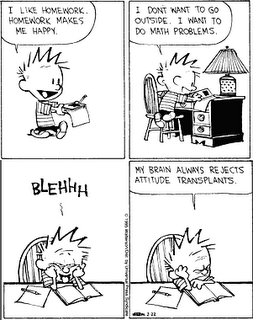Over the last two days, I moved my entire classroom of books, computers, materials, files, and equipment to another classroom. For the second time this school year.
Why? We started 2 teachers short in the science department. We were able to pick up one three weeks into the school year. Because the position I held last year, in the 9th grade academy, was switching to mostly Biology, I volunteered to move out, necessitating the first move. Although the classroom was smaller and had less storage, I was teaching 4 Physical Science and two Chemistry for the Technologies, which I preferred.
Last week, the high school lured a middle school science teacher to the high school. He'll be arriving Tuesday. Trouble is, he was only Chemistry, and couldn't teach the Bio classes. This made some switching of classes necessary, to avoid issues of certification. I was one affected. I lost my ChemTech classes, and added two Bios. Also, we had to flip-flop two Physical Science classes. I wasn't exactly happy, but I understood that we had to do it.
So, I had about 1 week to pack up the stuff, move it, and set up for the new classes on Monday. I'm moved in, but surrounded by boxes. My files are a mess, I may not get my old file cabinet in for a few days, and I have to get an extra copy of lesson plans to the new teacher - he shouldn't walk in cold without some help. He's taking the Praxis Monday.
What's the upside?
- My Bio classes are better students - they're already had Physical Science, and they rank higher in math skills and academic performance. So, even though I'll be having to put a fair amount of time into catching up, it should be OK.
- I have a Bio teacher next door - she's a VERY sharp lady, and I plan to lean on her a LOT.
- I finally have a storage room again.
- The new room is bigger, and has MUCH cabinet storage. Several sinks, instead of just one.
- Air conditioning works. As well as the heat, when needed.
- I have lots of chips in my stack, since I made the changes without complaining. The principal owes me, and he's a guy that remembers those things. Could come in handy someday.
- Many of the kids I had before - helps in getting acclimated with names and stuff. Several of them were QUITE excited to hear they'd have me again. Good for the ego.
The kids and parents weren't all happy, but they weren't that upset. They're a good bunch, and, I think, recognize that the change has some positives. I was open in expressing my optimism and focusing on the good of the move, and I think that helped.
On top of moving yesterday, I had to take tickets at the football game. We all have to do that once a year. But, at least I got it over with, and I can kick back for the rest of the year.
I'll take some pictures Monday, before I put the room back to order. Then, I take some "after" shots. I'll post the contrast in a few weeks.













